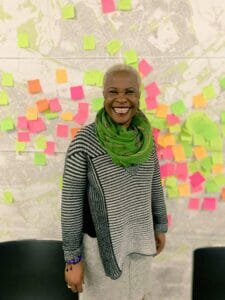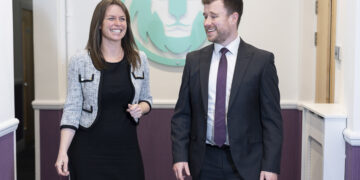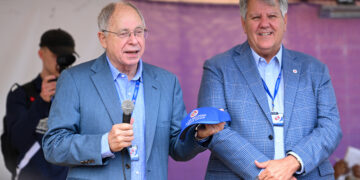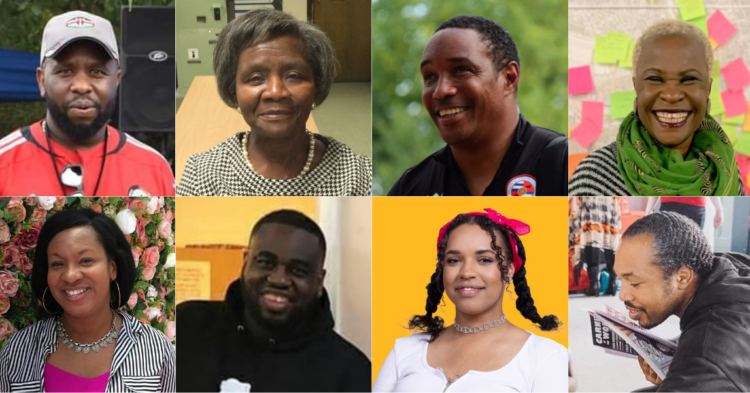THE UK celebrated Black History Month in October, an opportunity to acknowledge the achievements of generations who paved the way for two million black people to call this country their home.
But as attention shifts, undertones of subtle and overt forms of descrimination persist, while countless victories remain untold.
Through the words of eight individuals representing various social groups within the town’s black community, Reading Today explores their lived experiences and views on recent progression.
From Reading’s first female West Indian pastor to a domestic abuse survivor who’s helping young people access help, no two accounts are the same, but a common theme in all is a determination to fight for what is right.
On Wednesday, June 22, Reading Borough Council marked Windrush Day with an event which taught hundreds of children about the pioneers who emigrated from the Caribbean to the UK between 1948 and 1971.
That week, the council also honoured one of those people, its chaplain Una Chandler, for 20 years of service in a ceremony at its central Reading offices.
In fact, Una’s story began some 4,000 miles away in her native Barbados, a far cry from the Royal County of Berkshire.
On #WindrushDay2022 my mum celebrates her 20th anniversary of volunteering for @ReadingCouncil
Her humble dedication, commitment and kindness represents a generation of West Indians who contributed massively to this country and communities.
Thank you Windrush generation pic.twitter.com/7A3G33Rgh8
— Louise Chandler (@chandlerlou) June 22, 2022
On November 1, 1961, a 17-year-old Una boarded a flight across the Atlantic. With just £2 in her pocket, she made the move at the behest of her partner, John, who was already in England. Landing at Gatwick Airport, Una was excited to get married and start a new life of hope and opportunity.
She explained: “It was a shock for me, coming over at that age, you never know what to expect really. The weather was something. I explained to my mother I was out and about for work and that my breath was like smoke. She found it extraordinary and wondered if I was smoking a cigar.
“They were happy times for me personally. Gladly, I got used to my surroundings and soon found myself fitting into the community.”
As a Christian, church had always played a key role in Una’s life. Despite being rejected from traditional services due to the colour of her skin, she found joy in establishing worship opportunities with other members of the town’s West Indian community.
Initially meeting at people’s houses, the group grew and became a focal point for black Christians in Reading – The New Testament Church of God still operates in Caversham today.
After the passing of her late husband, Una’s resolve saw her break barriers in becoming the first female West Indian lay preacher on the Reading and Silchester Methodist church circuit. She was the only one for 18 years.
On reflection, she said: “I think I’ve opened doors for other people. Since my time, we’ve had a few other Caribbean preachers and some have come to thank me, saying I paved the way for them and that they now have the opportunity to follow on.
“I’m one of those people who’s very determined. I’ve got this spirit about me and if I want to do things, I take the challenge and I never stop.
“I took it as an opportunity for people who live in villages who had never come into contact with a Caribbean person, so there was me representing my Caribbean people. It broke down that partition.
“I think we’ve been in this country for so many years, served in this country and worked hard, it’s time for us to really stand up now and fight for what is right.”
Her six children have each gone on to achieve success in their own right. Daughter Louise Chandler spoke of her experiences in the marketing, communications and journalism industries.
She explained: “When it comes to representation, I’m very much used to walking into spaces and being the ‘only one’. But now, I think there’s more appetite to talk about it.”
Louise feels that individuals and organisations are beginning to value diversity, citing recruitment as an area where companies are making strides to remove bias.
Figures back her claim, with the number of Black, African and Caribbean people in employment in the UK rising from 633,000 to 949,000 between the fourth quarter 2007 and the fourth quarter 2018, according to Statista.
She said: “I ran my own business for six or seven years. When I used to go to networking events and walk into spaces where it would be mainly white men, I’d get looked at from head to toe. That was probably the cue for me to shy away or walk out and leave, but I wouldn’t.
“I’d take a deep breath and introduce myself, look them in the eye because I wasn’t about to apologise.
“There was a generation that was maybe a bit apologetic, because that’s what you did to survive, especially in the days of brutality and extreme overt and physical racism, you had to, as we would say, ‘small up yourself’ to survive. But now we have to be unapologetically black.”
Minority ethnic groups have been fighting for equal opportunity for centuries, although scrutiny has sharpened in recent years through findings from commissioned reviews and reports.
According to The Black Footballers Partnership’s Szymanski report, black players make up 34 percent of the English Football League but only four percent of managers.
In sport, opportunities for minority ethnic professionals in managerial positions are particularly scarce.

Reading Football Club sits at the heart of the town’s identity. For some, trips to Elm Park or the Madejski have held a near-sacred pride of place in their weekly routines for as long as they can remember.
The club’s first team manager is Paul Ince. As a player, the tenacious midfielder enjoyed success at Manchester United, Liverpool and Inter Milan, also earning 53 caps for England.
Ince’s remarkable technical ability and leadership saw him become the country’s first black captain in 1993. He is now one of only three black managers in the Championship, England’s second tier.
In 2008, Ince became the Premier League’s first black manager after spells with Macclesfield Town and MK Dons. In the competition’s 30 year history, there have been just 10 black managers.
Speaking after the Royals’ victory over Hull City, Ince was swift to praise his counterpart, Liam Rosenior, who had recently been appointed manager of the East Yorkshire club.
He said: “First and foremost, I want to congratulate Liam on getting the job. It’s great to see a young, black English manager get the chance to manage at this level.
“My first job was at Macclesfield, bottom of League Two, while other managers were getting higher up, so to see someone like Liam in a position where he’s young and learning, but getting the opportunity to manage this fantastic club and learn to grow. That’s pleasing for me personally.”
Alongside the likes of John Barnes, Ian Wright and Les Ferdinand, Ince is part of a generation of black English footballers who paved the way for the current crop of talent.
One of his beneficiaries is Tyrese Fornah, who signed for Reading on loan from Nottingham Forest in the summer. Born in Canning Town, Fornah was raised just a stone’s throw away from Ince’s hometown of Ilford in East London.
Speaking soon after putting pen to paper with the Royals, the midfielder admitted that his new boss had been a figure of reference to him and many of his contemporaries growing up.
On signing, Fornah explained: “[It was] very straightforward for me because of the gaffer, coming from the same area as me, we’re both East London lads and I can relate to him.
“What he’s done in his career, coming from my area as well, he’s the poster boy, everyone wanted to be like Paul Ince.”
The Royals will look to build on a promising start to the season when domestic football returns after the World Cup, and will rely on strong performances at their home ground, the Select Car Leasing Stadium in Whitley.
Alice Mpofu-Coles is one of three councillors who represent the ward having been re-elected in May’s local elections. She also serves on various equality and inclusion boards across the town and holds a doctorate in human geography.
Her research project investigated the integration of young refugees travelling from Zimbabwe to the UK, exploring how factors such as education, work, relationships, social networks and cultural practices determine identity and participation levels.
The cause is one close to Alice’s heart, having lived out that very experience in 2002.
The Whitley councillor reminisced about her first impressions of Reading, admitting to feeling ‘amazed’ by its diversity. She believes there’s still some way to go before misconceptions about refugees are banished, however.
She explained: “There are so many stereotypes about refugees which are incorrect, people think of something else when I tell them I’m a refugee because I’ve been well-educated and had a successful career.
“But I came in the same way [as other refugees], why do people differentiate them from me?”

councillor of Whitley ward. Picture: Alice Mpofu-Coles
Alice’s professional success has not left her immune to race-based ignorance. As one half of an interracial couple, she spoke about handling subsequent ‘microagressions’.
Throughout her 12-year marriage to her husband, who is a white British man, she has found that laughing off snide remarks is the best way to maintain peace.
She added: “I have to work hard, I have to constantly prove I am a good councillor. I have to be at 200 percent. I am not a person who is allowed to make mistakes, because of my colour.
“Some systems are not made for people like us, so we need to deconstruct them. It is exhausting, I hit the wall most times. Sometimes I wonder if I should give up, but if we put a light in one person, that light can make another light in another person. There will eventually be so many lights around the world.
“I’m a councillor for Whitley. 90 percent of Whitley are not black, but I am a councillor for the people of Whitley and I am passionate about them. This is my country as much as it is for my eldest who is 30 and came here when she was 9.”
In describing what her culture means to her, she said: “My culture is my home, and my home is me. As a person who has lived all over the world, I carry my culture with me, it’s embedded in me.
“In Southern Africa, we have the word ‘ubuntu’, which means you are because of other people. You respect the elderly, those in authority and those around you. It’s all about respect. It’s a reminder that you are not alone in what you do, you cannot do things alone.”
Although times are changing, young black men and women still face many of the same challenges their seniors did.
Having occupied various youth worker roles within Reading Borough Council and other agencies since 2001, James Pyle has been well-positioned to comment on this.
He identified communication as an area where youngsters are not being afforded the same freedom to express themselves across the board.
James said: “In private schools, kids are encouraged to debate, to argue. For a lot of our young people, you get in trouble if you ask questions. In many ways, the school system confuses passion with disruption.
“We need them to use their outspokenness in a good way, in a way that is palatable for everyone.”
One of the beneficiaries of James’s work is Pride of Reading nominee Kelvin Husbands, who is the founder of a network of youth clubs called Grassrootz.
Through evening sessions, mentorship programmes and trips, the organisation helps children develop personal skills, establish healthy relationships and raise aspirations.
Kelvin explained: “For me personally, I’ve been inspired by the young people we work with. I’m 37-years-old but they’ve really inspired me to take a risk and be my own boss.
“From a young age, you’re told you have to work for someone else or within the framework of a company, but the reality is when they’re ready to get rid of you, that’s it. They might do other jobs as well, but this group is doing things for themselves.”
Kelvin has got the next generation of black youngsters focusing on their positive attributes and what it is they have to offer, rather than dwelling on their weaknesses. The mentorship programme gives young black men and women the platform to take on responsibilities they might not be bestowed with in mainstream education.
Confidence is the name of the game for Kelvin, who mentioned one particular girl who was initially reluctant to participate in sessions but was recently able to secure three job offers from four job interviews, largely thanks to the skills and self-belief she has picked up at Grassrootz.
The youth worker reflected on not having many black or male teachers or ethnic minority bosses to serve as role models. Now, the young people who attend Grassrootz have a front row seat to watch a black-owned organisation thrive.
Kelvin takes his responsibility as an example to the group’s youngsters seriously and hopes to continue inspiring the next generation.
????️ "The occasion will forever be ingrained in the Kenyan community’s hearts"
???????? Check out snaps from Kenyan Family Fun Day celebrating Reading's cultural diversity #rdguk #kenya @UtulivuRdg @Herrings18 https://t.co/FINUNF90Ga pic.twitter.com/DLP4D6d37C
— Ji-Min Lee (@JmlJourno) August 8, 2022
Ken Mwaura Gathere is the founder of Reading’s Kenyan Family Fun Day, an annual event which celebrates not only the town’s Kenyan community, but all ethnicities.
In 2014, Ken was overwhelmed by the support he received following his mother’s passing. Inundated by the outpouring of love from neighbours and friends, he wished to thank them but was unable to accommodate everyone in his home.
Instead, he assembled a committee to organise a low-key event at Winnersh Community Centre.
Eight years on, and the fun day has become a fixture in Reading and Wokingham’s summer fete season.
He explained: “We felt like as much as we could hold an event amongst ourselves, we wanted to share it with the community. It started off as a barbeque with parents and their kids, all funded by a group of 40 of us and we hosted around 200 visitors.
“The event has gone from strength to strength, taking place every summer since 2014, except during the pandemic. Last year we had around 750 people attend.
“Through the food, activities and socialising, we hope to capture the hearts and minds of the community, particularly the kids.”
Ken expressed his gratitude to the UK for its warm welcome and for the opportunities it has afforded him and his family.
It has not been plain sailing for the Kenyan however, who raised the issue of recognition for attainment, particularly among black youngsters.
He said: “You get the sense that sometimes our children have to work harder than the others. I’ve seen it in football with my children, for example. When scouts come and pick players to advance to a higher level and the only one not taken is black, you want to believe it’s because he had an off day, and not for any other reason, but you have your feelings.
“It’s the same in schools. To receive the same credit as other children, black children must be exceptional. They cannot just be good.”
Kenyans in Reading Family Funday returns in 2023 on Saturday, August 5, at Ibis Club, Scours Lane.
Everyone is welcome to attend the event which marks the end of summer.
Ken said: “We want to gather people of all cultures, not only the Kenyan community, to make this event a truly multicultural occasion.
“As Kenyans, we work hard and appreciate the opportunity to be [in the UK] and all the benefits it has provided. We want to share that dream with our kids.”

The importance of belonging is not lost on Jemima McKenzie, inclusion and communities officer at Reading University Students’ Union (RUSU). Her remit involves ensuring students feel supported and welcome throughout their studies.
A challenging three years as a student inspired her to apply for the role to help others receive the support she didn’t always feel she was afforded.
Jem arrived at the university in 2019 having taken a year out to earn enough money to fund her studies. As the first person in her family to attend university and a survivor of domestic abuse, she was dealing with more than the average 19-year-old.
Also a black female member of the LGBTQ+ community, Jem’s first term was littered with incidents of racism from her peers.
She explained: “I already felt like I didn’t fit in. I was experiencing culture shock. On nights out, people would give you dirty looks, they wouldn’t look me in the eye, they’d pretend I’m not there. I was ignored.
“That’s something I thought was part racism, part stereotype. I don’t really know why it happened. My mental health was probably at its worst at that time.”
Midway through her first term, Jem pulled a tendon in her ankle on a night out leaving her bedridden for three weeks. She went to A&E to get examined, but was sent away and ordered to rest.
She recollected attending her first lecture back and seeing a classmate, who had sustained a near-identical injury to her, had been provided crutches.
“That was the first time in my life I had experienced discrimination on a medical level,” she explained.
“Because I was a black woman, they just assumed I could handle it. I don’t think it was intentional, but it was definitely [linked to] preconceptions. That was when it hit me.”
A combination of Jem’s stoic disposition and a fear of being misunderstood prevented her from taking exceptional circumstances provisions to delay her assessments.
She explained: “I already felt uncomfortable reaching out for help because of the colour, because of my race, because of my sexuality. I already felt different. When I realised I was outside of the usual demographic, it made it really hard to reach out to someone who wouldn’t necessarily understand me.
“Everyone I spoke to was white and appeared to be straight, and that didn’t help me. I didn’t speak about the racism I was experiencing because they would not understand.”
As such, in her current role, she is lobbying for an equality, diversion and inclusion (EDI) counsellor to ensure students of all backgrounds feel comfortable when seeking support. She is also leading a plethora of student-facing initiatives.
Despite coming within a whisker away from dropping out, the adversity Jem faced and overcame, alongside her passion to help others in similar positions, made her the prime candidate for the role.
She said: “When I found out about the officer roles in first year I never thought I’d do it, it was too much responsibility, I’m not a leader. But the person I was then compared to the person I was in third year were two different people.
“I was confident in my abilities, I knew who I was and I’d found a sense of belonging. It wasn’t easy, but I got there. I know how difficult it is for so many students, I had the chance to make a change and I want to be that change. Everything I went through led to this.”
























